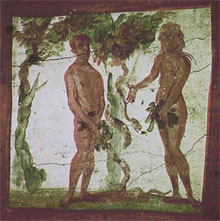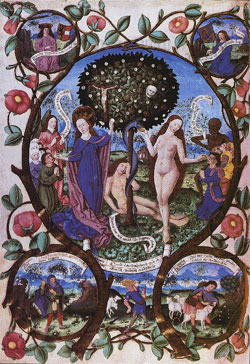Memento Morum: A Dialogue with Death
For Sunday February 13, 2005
First Sunday in Lent
Lectionary Readings (Revised Common Lectionary, Year A)
Genesis 2:15–17; 3:1–7
Psalm 32
Romans 5:12–19
Matthew 4:1–11
 |
Adam and Eve third centry fresco |
With Ash Wednesday this week, most Christians around the world (but not most American evangelicals) begin their observance of Lent. Since the fourth century, Christians have observed the 40 week days before Easter as a season of sorrow, reflection, repentance, fasting, abstinence, and acts of mercy. Perhaps you have seen a friend this week with ashes conspicuously smeared in the middle of their forehead. Maybe your colleague at work has mentioned giving up meat, chocolate, or alcohol. In a culture that adulates indulgence, hubris and bravado, Wednesday's ashes signify a wonderfully and outrageously counter cultural act of humility. As a season in which we befriend our brokenness, acknowledge that not all is well with our soul, and lament the pain of so many people in our world, Lent strikes me as one of the most sensible and brutally realistic liturgical seasons of the year.
Lenten humility is not an end in itself, some act of morbid self-hatred or misanthropic self-denial, for above all Lent anticipates and culminates in the Easter celebration of resurrection life. Whatever else Christians believe, we believe that God in Christ will vanquish sin and death, and so we are the ultimate optimists who affirm life. But until then, Lent reminds us that Easter's celebration of life must first pass through the narrow and bitter way of death. This is true in a figurative sense; but it is also true in a literal sense. Jesus rose from the dead, but not before he died a real death; our hope is for the same. That is why at this time of year Christians find it entirely healthy and salutary to "remember death"—memento morum.
Whereas Christians anticipate and reflect upon death, the extent to which our society ignores and denies death is nothing short of tragic. We idolize strength, vigor, and youth, and marginalize the weak, the elderly and the infirm. Age spots, decreased energy, wrinkles, aches and pains are anxious cause for diets, cosmetic surgery, and pill-popping, but almost never for a reality check. Even at death itself morticians make our corpses appear as life-like as possible, and mourners insist how "beautiful and peaceful" the dead body looks. A friend recently gave me a book with the title Younger Next Year; Turn Back Your Biological Clock (2004). The marketing experts know just how to manipulate our deepest insecurities, and I will read this book, even though I know that next year—if I make it—I will be older and not younger, nearer to death and not farther from it.
 |
The tree of death and life, Salzburg, 1481 |
Our culture's denial of death finds deep, theological roots in the Hebrew Scriptures for this week. The Old Testament reading includes the most pernicious lie ever told, when the serpent tells Eve, "You will not surely die" (Genesis 3:4). This lie, so mysterious back then and so irresistible today, harms us, for while it is normal and natural to avoid the unpleasant, to persist in loving this lie perpetuates the ultimate death wish for both this side of the grave and the side beyond.
In 1974 the cultural anthropologist Ernest Becker won the Pulitzer Prize for his book The Denial of Death. The fear of our eventual extinction is so terrifying, so anxiety-producing, Becker argued, that virtually all cultures construct elaborate schemes to deny our mortality and enable us to believe that we are immortal. In fact, Becker believed that perpetuating this denial of death constitutes one of the chief functions of culture. But denying death is disastrous. It causes us to form illusory, false selves, and even worse, thought Becker, on the social level it foments all the horrific violence and aggression against others that we see in our world today (since we must prove other death-denials as false, and even eradicate them, else ours is exposed as a lie).
If you are lucky, reality will hit hard, life will slap you around, and the older you get the harder it becomes to believe the serpentine denial of death. Friends die. Kids grow older and leave. Your longtime neighbors move. The newspaper obituaries suddenly provoke reflective reading rather than idle curiosity. Your physical capacities of both body and mind degenerate, slowly perhaps, but nevertheless just as inexorably.
Christians, however, do not wait for such a serendipitous wake-up call to move them beyond culture's denial. At our best, we do not evade, lie about, flee from or candy-coat the specter of death. Rather, with the Lenten practice of actively contemplating our own death, we pre-empt the inevitable. In Becker's words, adopting a phrase from Luther, the Christian seeks to "...taste death with the lips of your living body [so] that you can know emotionally that you are a creature who will die."1
This counsel to "remember death" was standard wisdom for the early church fathers. Gregory of Nazianzus (329–388) echoed Plato when he suggested that our present life ought to be "a meditation upon death." He advised his friend Philagrios to live "instead of the present the future, and to make this life a meditation and practice of death." To the priest Photios he wrote: "Our cares and our attention are concentrated on one thing only, our departure from this world. For this departure we prepare ourselves and gather our baggage as prudent travelers would do." In his treatise On Virginity, Athanasius (296–373) encouraged readers to "recall your exodus every hour; keep death before your eyes on a daily basis. Remember before whom you must appear." John Climacus (525–605) advised us to "let the memory of death sleep and awake with you." So too St. Benedict, who in his Rule (c. 530) advised his monks to "see death before one daily."2
By contemplating my death, I live more fully in the present moment, and embrace and affirm all that is life-giving. I prepare myself for that most inevitable and important date with destiny when I will pass from time to eternity. If it is true that "at the moment of our death we will all know for certain what is the outcome of our life" (St. Gregory of Sinai, 13th century), then instead of living today in ways that death will render meaningless if not tragic, I can alter my course here and now. Anticipation, then, functions as an act of preparation.
 |
Genesis 3, from a Catholic German Bible, 1534 |
In his book Tortured Wonders (2004), Rodney Clapp recounts a person who chose Ash Wednesday for her one and only church appearance of the year. St. Bartholomew's Episcopal Church in New York City stands at the corner of Park Avenue and 51st Street, at the epicenter of that island's remarkable concentration of wealth, power, business, and entertainment. One Ash Wednesday morning the priests had begun the ritual of smearing ashes on the foreheads of worshippers with the solemn words, "dust you are, and to dust you shall return" (Genesis 3:19), when a gorgeous young woman, impeccably dressed, came forward and knelt at the altar. The young woman was visibly nervous, and as she knelt the priest realized that she wanted to speak. As he leaned forward to trace an ashen cross on her forehead, she whispered, "Father, I am a model. I know I only have a few years, then I will be too old for this work. My body is aging, and I can hardly admit it to myself. I do it once a year at this service. So rub the ashes on. Rub them hard."
[1] See Glenn Hughes, http://faculty.washington.edu/nelgee/lectures/speeches/hughes_1.htm.
[2] Nikolaos P. Vassiliadis, see http://www.orthodoxinfo.com/death/memory_death.aspx.





